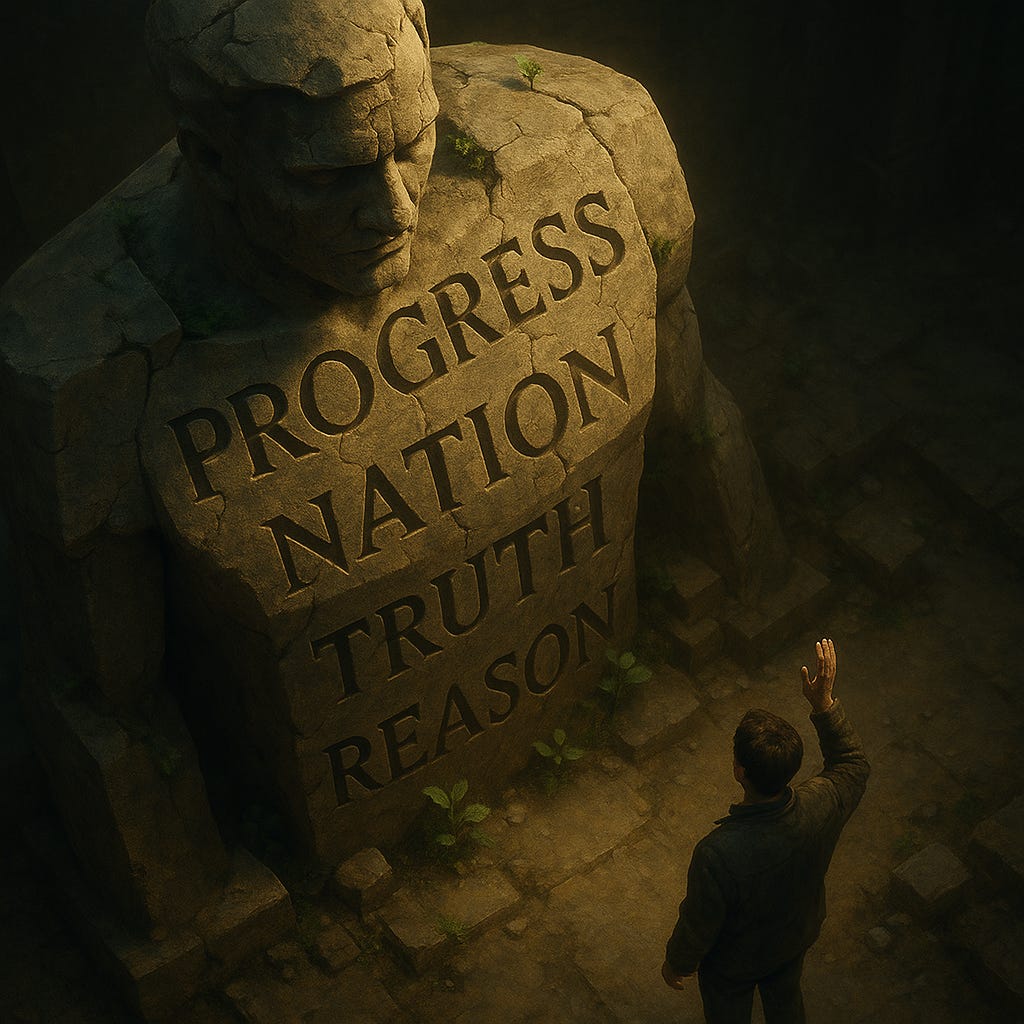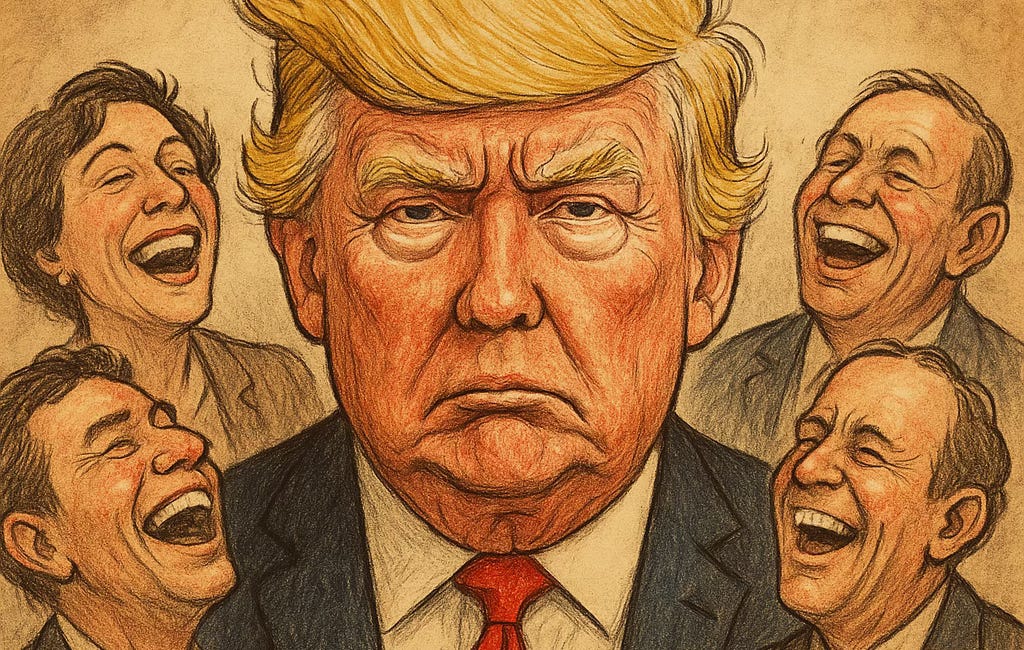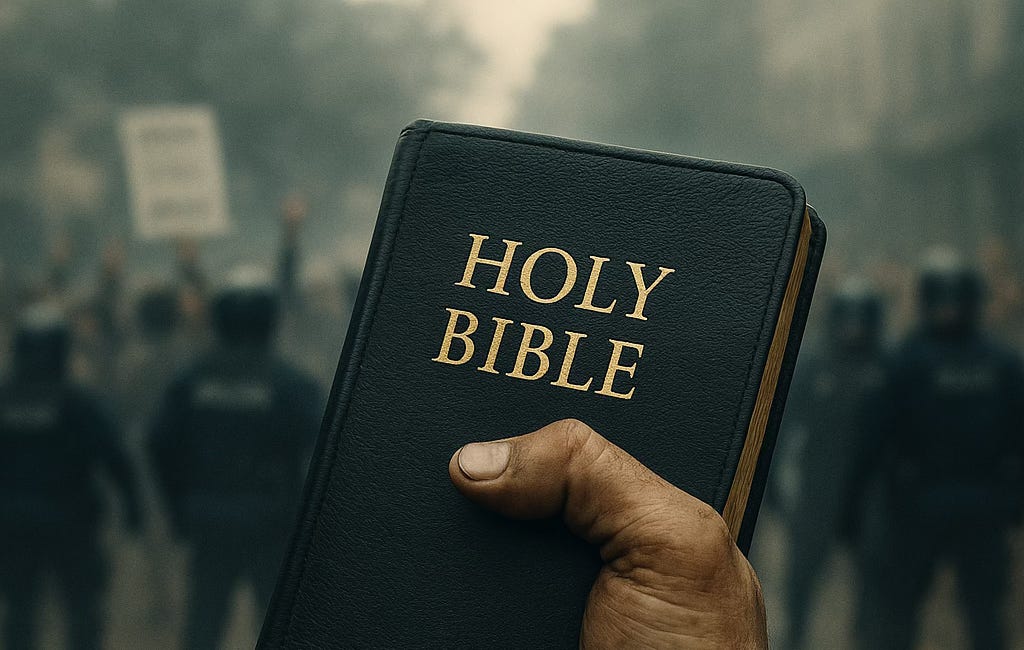How Ideology Becomes Idolatry
The risks of elevating belief in progress or politics into quasi-religion
The New Altars
Some mornings I wonder what we really worship now. Not in theory, but in practice. The things that hold our attention. The ones we defend without thought. Maybe that’s where faith lives now, in the small devotions we don’t notice.
I’ve noticed something unsettling about myself and about the world I live in. We like to think we’ve outgrown the age of idols. We say we’re modern now, rational, liberated from the primitive need to worship. We build our cities, scroll our screens, debate our ethics, and tell ourselves we’ve replaced superstition with sense.
But I’m not sure that’s true.
If anything, it seems we’ve only traded the old altars for new ones. The gods are gone, but the temples are full. They just have different names now: progress, nation, market, party, algorithm.
Each comes with its own rituals, its own clergy, its own sins and absolutions. Each promises meaning in exchange for devotion. And if I’m honest, I’ve paid my dues at more than one of these shrines.
I’ve believed that reason would save us. I’ve believed that progress was destiny. I’ve believed that my side was the good one.
And I’ve been wrong every time I believed too much.
We’ll always worship something; the only question is whether what we worship deserves it.
The Hunger Beneath Belief
What fascinates me most isn’t the ideology itself, it’s the hunger that creates it. Human beings can’t bear the thought of meaninglessness for long. We’ll build a cathedral out of anything that gives us direction.
We used to pray to the stars for guidance. Now we look at the data. Same gesture, different sky.
Maybe that’s why I hesitate to mock anyone’s creed, political or spiritual. The impulse to believe is the same. It’s the yearning for order in a world that doesn’t owe us any.
The danger begins when belief forgets its own limits, when it stops being a lens and becomes a cage.
I think about how often I’ve seen this in myself, that desperate need to know, to be certain, to declare this is the way and that is the enemy.
Certainty feels good. It’s cleaner than humility. It silences the chaos. It lets you sleep.
But it also blinds you to everything that doesn’t fit your map.
And then you wake up one day realizing your map has replaced the world.
Progress as Prayer
There’s something almost religious about the way we talk about progress.
We invoke it with reverence, as if it were a law of nature. We tell ourselves that history is a staircase and we’re always moving upward.
But I’m not sure the human story has a direction at all. It’s not a staircase; it’s a spiral. Sometimes we ascend, sometimes we descend, sometimes we just spin.
Progress can be holy or hollow depending on what it serves. The wheel turns faster, the engines get cleaner, the networks get wider, but what about the soul that built them?
Has it grown wiser or just busier?
We build machines to free ourselves, then become the machines.
That’s not progress. That’s worship in disguise.
Maybe progress is our new prayer. We chant its metrics, offer our attention as incense, and hope it redeems us from mortality.
But it can’t. It was never meant to. The universe doesn’t owe us transcendence just because we’ve upgraded our software.
Political Liturgies
Politics, too, has taken on a kind of priesthood. Every movement has its catechism now, its sacred texts and its devils. Every cause claims righteousness; every rival is a heretic.
You can see it in the eyes of the faithful at rallies, right or left, it doesn’t matter. The glow is the same. The certainty is the same. The language of grace and damnation has only changed uniforms.
We call it justice or liberty now, but the tone is pure revival tent.
I’ve caught myself preaching from that pulpit too, fired by conviction, deaf to nuance, confusing zeal for wisdom. It’s intoxicating. It feels like purpose. But it’s not the same as truth.
The truth rarely comes with applause. It’s quieter than that.
And yet, in the absence of faith, politics offers belonging. That’s its real seduction. It gives us a tribe, a sense of moral identity.
We want to matter. We want to be on the side of the light.
But when belonging becomes our god, conscience becomes its casualty.
The need to be right can outgrow the need to be kind.
I’ve seen people lose their humanity defending their ideology and then insist they’re saving it.
Certainty, the Quiet Narcotic
Ideology is comforting because it tells us we’re right. It gives us a way to stop thinking, a way to outsource doubt.
And who doesn’t want that? The mind gets tired. The world is loud. Certainty is quiet.
But quiet isn’t always peace. Sometimes it’s just the sound of a locked door.
The moral danger isn’t in having beliefs; it’s in mistaking our beliefs for ultimate truth.
Faith, at its best, keeps us open to mystery. Ideology, at its worst, seals the room and calls it heaven.
I think of Nietzsche’s warning. Fight monsters too long, and you risk becoming one.
That line should be engraved on every revolution, every reform, every righteous crusade.
Because the moment we stop seeing our own reflection in the thing we oppose, we’ve already begun to resemble it.
It’s not the monster that changes first. It’s us.
The Gods We Make of Reason
Even reason can turn into religion.
I’ve met people who worship logic the way others worship scripture. They speak of rationality as if it were purity itself, immune to bias, beyond human frailty.
But reason is only as honest as the heart that wields it.
The Enlightenment gave us light, but it also gave us shadow, the illusion that we could conquer the moral universe with math.
We can’t. The soul is not an equation.
To live wisely, I think, is to hold reason and wonder in tension, to let curiosity correct conviction.
I trust reason because it asks questions. I distrust ideology because it stops them.
The Loss of Wonder
What dies first when ideology rules is wonder.
When you already know the answer, you stop asking the question. You stop being surprised. The sacred becomes the strategic. Everything turns into a means to an end.
That’s how people end up burning books or banning ideas. That’s how they silence art, or mock empathy as weakness.
That’s how moral imagination dies, not through censorship alone but through certainty.
A mind in awe is still free.
A mind in allegiance is not.
The Quiet Return to Reverence
So what do we do instead? I don’t think the answer is to abandon belief. It’s to re-humanize it. To let it breathe again.
We can hold our causes with conviction and still admit our blindness. We can build our future without pretending it’s salvation. We can seek progress without making it our god.
Maybe reverence is the word I’ve been looking for all along. Not belief. Not disbelief. Just reverence, the posture of wonder before what we don’t yet understand.
The humility to know that our greatest achievements are still made of dust, and that truth belongs to no single banner.
If ideology builds walls, reverence opens windows.
If idolatry demands allegiance, reverence invites dialogue.
If ideology says “We have arrived,” reverence whispers, “We’re still learning.”
Reverence is not surrender. It’s awareness.
Maybe the future doesn’t need more believers or skeptics. Maybe it needs caretakers, people who can hold conviction without clenching it.
A Question Worth Keeping
I still believe in progress, in politics, in reason. But I try not to bow to them.
I’ve learned that the human spirit doesn’t need more gods; it needs more light. It needs the courage to walk without guarantees. It needs the grace to hold faith and doubt in the same trembling hand.
Because when we make gods of our ideas, we stop being seekers and start being salesmen.
And somewhere in that transaction, the soul is lost.
So I have to ask, both of myself and of you:
What are the quiet idols in your own life, the ones that look like principles but act like gods?
Light Against Empire - The Podcast
Support My Work
Light Against Empire is free for all. If my words have value to you and you’re in a position to help, you can chip in with a monthly or yearly donation. Your support keeps the writing alive, the lights on, and the fire burning. Thanks!







Another beautiful piece Dino, this will be my meditation for a few days. I am reminded of this from Rumi, “Sell your cleverness and buy bewilderment”. In the course of these modern times I have become so certain of my belief that I’ve literally lost the plot. Thank you for the reminder to keep the windows open 🙏
A mind in awe is still free.
A mind in allegiance is not.
Keep your mind curious, try to evolve, to be different today than you were yesterday, accepting at the same time the uncontainable wealth of wisdom and information that our Universe is offering - just enough to keep you humble ✨️
I believe you just summarised it so beautifully in your letter
Keep us curious and grounded at the same time 🙏